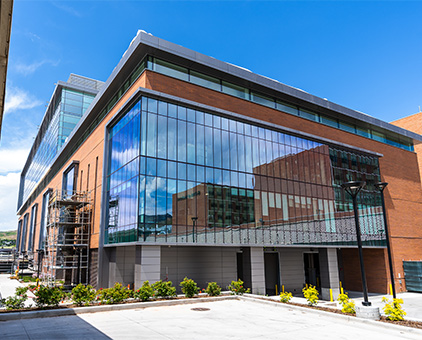Speech and Hearing Science
Arts Pass
22
Average
Class Size
Courses
Getting Started
- Begin Gen Ed courses
- Complete CSD 1010 - Intro to Communication Sciences & Disorders & CSD 2200 - Physics of Speech & Hearing
- Take CSD elective courses in areas that interest you
Making Progress
- Consider Gen Ed courses that complement the major like Psychology or Disability Studies
- Start working on CSD required core courses as ordered in sequence
- Meet with a CSD academic advisor to plan your schedule
- Generate a DARS report & track your progress - maintain a 3.0 GPA in CSD courses to remain in the program
Finishing Up
- Complete core courses
- Finish 25 hours of observation
- Prepare for grad school - ask for recommendation letters from professors & submit applications by Jan 15th
Community
Getting Started
- Familiarize yourself with campus, academic advising, & academic classes
- Meet people & get involved - explore clubs, organizations, & intramural sports at the Get Involved Fair
Making Progress
Finishing Up
- Seek a meaningful leadership position - serve as a leader for NSSLHA or another organization
- Join alumni groups to stay in touch
Knowledge & Skills
Getting Started
Explore campus resources to excel in courses:- Learn online tools like CIS & My Degree Dashboard
- Visit the library
- Meet with your advisor
- Research program requirements
- Attend major exploration events
Making Progress
- Declare your major & minor
- Check in with your advisor to make sure you're on track
- Identify opportunities to engage in research within CSD or UROP
- Consider opportunities to expand your skill set
- Take a course outside your area like public speaking, Psychology, Special Ed, or American Sign Language
Finishing Up
- Practice what you learned & share your knowledge - participate in an internship or complete a research project & attend conferences to share your research
Transformation
Getting Started
- Connect with campus entities like ASUU, Student Success Coaches, & the Student Life Center
- Use your Arts Pass to visit campus museums or attend a play
- Interview a professional in your field of interest
Making Progress
- Try activities outside the major at the Natural History Museum, Primary Children's Hospital, or Huntsman Cancer Institute
- Try a CEL course offered through the department
- Visit the Bennion Center to explore volunteer opportunities
- Consider an Alternative Spring/Fall break
- Attend a Learning Abroad 101 session
Finishing Up
- Complete course work in CSD
- If you've done research, consider presenting at the Undergraduate Research Symposium
Impact
Getting Started
- Participate in the Be Well Utah Fair
- Get involved with activities like Special Olympics or the U of U Reading Clinic
- Find health-related student groups like SPEAK & Students for Choice
- Attend a MUSE Casual Friday
- Connect with a peer mentor through the U of U Mentoring Program
Making Progress
- Apply for leadership positions in clubs and organizations
- Visit your Career Coach & look into summer jobs in health professions
- Start or continue a volunteer project somewhere like Red Cross, local hospitals, nursing homes, U-Fit, speech & hearing clinics, or Connect2Health
Finishing Up
- Guide new first year students as a Campus Life Mentor
- Work as a tutor
- Become an orientation leader
- Complete a service project
Careers
Getting Started
- Take Focus2 or the StrengthsFinder assessments through the CPDC to know yourself better
- Use O Net & Who Hires U of U Grads to research career options
- Meet with a Career Coach for guidance
- Learn more about the speech-language pathology & audiology professions at asha.org
Making Progress
- Explore & gain experience by completing informational interviews, shadowing, volunteering, or working in areas of interest
- Use career events (Career Fairs/Meet & Eats) & resources (Handshake/Forever Utah) to get connected
- Develop back-up plans for your primary career goal
- Attend the Career Conference to workshop your resume & LinkedIn profiles as well as build references & contacts
Finishing Up
- Meet with a Career Coach to refine your application materials for graduate schools or jobs
- Practice interviewing
- Practice salary negotiation
Start Your Career Journey
Find support at the Career and Professional Development Center (CPDC)
About the Major
With a Speech and Hearing Science degree, you will gain an appreciation of the complexities associated with human communication and acquire an understanding of some of the more common mechanisms that lead to disorders in both children and adults. Our undergraduate curriculum provides students with the foundational knowledge needed to pursue pre-professional training programs in both speech-language pathology and audiology. These programs are all directed at improving the lives of individuals with communication disorders.
Learning Outcomes
- Learn the foundations of speech, language, and hearing disorder assessment and treatment.
- Learn to engage with the psychometrics and research and clinical methods that influence work in communication sciences and disorders.
- Develop a deep understanding of human communication including phonetics, anatomy and physiology of speech and hearing, language development, as well as hearing and speech science.
Plan & Prepare
At the U, we plan for our students to have an exceptional Educational Experience identified by four broad categories we call the Learning Framework: Community, Knowledge & Skills, Transformation, and Impact. This major map will help you envision, explore, design, and plan your personalized Exceptional Education Experience with the Learning Framework at the core. In addition to assisting you in planning your coursework and navigating the requirements of your major, this map will help you incorporate other kinds of experiences to expand your knowledge, support your development, and prepare you for the future you want.


